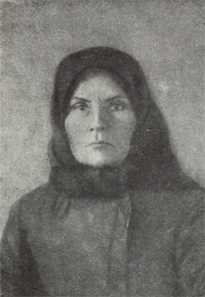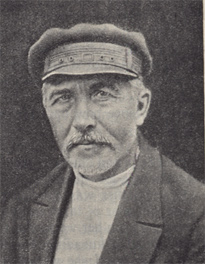
Zoya and Shura's Grandma
 |
| Mavra Mikhailovna, Zoya and Shura's Grandma |
The children loved to go and see Grandma Mavra Mikhailovna. She would give them a cheery welcome, and treat them to pancakes and milk. And afterwards she would find a free minute to play with them their favourite game of "turnip."
"Granny planted a turnip," Grandma would begin thoughtfully, "and she said, 'Grow, turnip, sweet, strong and very big.' The turnip grew big and sweet and strong and round and yellow. Granny went to pull up the turnip: she pulls and pulls but cannot pull it up…(Here Grandma would show how she tugged at the obstinate vegetable.) Granny called her granddaughter Zoya (whereupon Zoya would clutch at Grandma's skirt). Zoya pulls Granny and Granny pulls the turnip. They pull and pull but cannot pull it up. Zoya called Shura (Shura promptly grabs Zoya). Shura pulls Zoya, Zoya pulls Granny and Granny pulls the turnip—they pull and pull (the children's eyes are agog with expectation)…and pull up the turnip!"
And then, as if from nowhere, Grandma would produce an apple, or a pie, or even a real turnip. The children would hang onto Mavra Mikhailovna screaming and laughing, and she would present them with the gilt.
"Granny, let's pull up the turnip!" Shura would ask almost before he was inside the house.
About two years later, when somebody tried to tell the children the story of the turnip and began with the usual words, "Grandpa planted a turnip . . they both started to protest, "Grandma planted it! Not Grandpa but Grandma!"
My mother had worked from dawn to dusk all her life. She had the entire household on her hands—a house, a field and six children who all had to be dressed, washed, led and have their sewing done; and mother bent her back without sparing herself. With us children and later with her grandchildren she was unfailingly tender and tolerant. She did not just say, "Respect your elders," she always tried to make her ideas clear to the children, to make them reach their minds and their hearts. "Take this house we are living in," she would say to Zoya and Shura. "The old folks built it. Here is the stove which Petrovich built for us, what a fine one it is! Petrovich is old and wise, he's got hands of gold. You can't help respecting the old folks, can you?" Mother was very kindhearted. I remember, as a girl, if ever she saw a tramp—in those days many homeless wanderers were about—she would always call him in, give him something to eat and drink, and some old clothes.
One day my father opened the trunk, rummaged for a long time there, and then asked, "Mother, where is my blue shirt?"
"Don't be angry, Father," replied my mother awkwardly, "I gave it to Stepanych." Stepanych was an old peasant, who lived by himself, uncared for and ailing. Mother used to support him and help him as best she could.
 |
| Timofei Semyonovich, Zoya and Shura's Grandad |
Father said nothing at all.
Now, after so many long years, I often remember what a hardy, enduring, patient, goodhearted woman my mother was.
I remember the time our cow was stolen from us. Everyone knows what a misfortune that was for a peasant family. But Mother did not utter a word of complaint, did not shed a tear. Another year, I remember, there was a fire, and our whole place was burnt down to the ground. That was a great blow to my father. He sat on a fallen tree, his hands hanging hopelessly, his eyes fixed in despair on the ground.
"We'll manage, Father, never mind!" said Mother, going up to him. She stood beside him for a minute and added: "Don't worry, we'll return it all!"
Mother was quite illiterate; right up to the time she died she did not know a single letter; but she valued learning and respected it. It was thanks to her care that we children became educated people: she insisted that we should be sent to school, and afterwards to high school.
Our family was quite often in need, and I remember that when things got very bad my father decided t0 take my brother Sergei away from the fourth grade of high school. My mother would not hear of it. Bent on giving her son an education, she was ready to do anything—to go to the school principal, to humiliate herself, to beg him to give her son a schooling at government expense.
"You don't know a single letter, Mother, but you get along all right," Father would say gloomily.
Mother did not argue but stood her ground. "They are right when they say that learning is light and ignorance darkness," she loved to repeat. She knew from her own experience how dark life was for those who had no learning.
"When you go to school, study well," she would instruct Zoya and Shura. "You will grow cleverer, you will get to know a lot—it will be better for you and your folk."
Grandmother was a wonderful storyteller. She knew a great number of tales and could relate them without looking up from her work: she would go on knitting, peeling potatoes or kneading dough and all the time talking calmly, just as if she were thinking aloud.
"A fox runs in the wood and sees a woodcock sitting on a tree, and says:
"'Woodcock, woodcock, to town I have been!'
"'Chuck-chuck, chuck-chuck, that I have seen.'
"'Woodcock, woodcock, I've brought you a decree!'
"'Chuck-chuck, chuck-chuck, so I see, so I see.'
"'For you woodcocks not to sit on trees, but hop all day about the leas…'"
Zoya and Shura sit side by side on a low bench and do not take their eyes off Grandma. And she finishes the tale and begins another one: about Grey Wolf, about Bear Sweet-Tooth, about Cowardly Hare and again about Sly Fox.
Next: Brother and Sister
